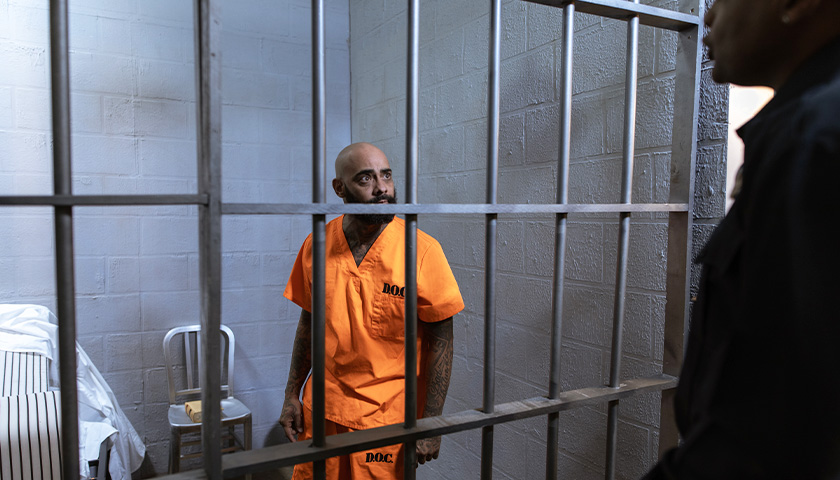Live from Music Row Friday morning on The Tennessee Star Report with Michael Patrick Leahy – broadcast on Nashville’s Talk Radio 98.3 and 1510 WLAC weekdays from 5:00 a.m. to 8:00 a.m. – guest hosts Henry and Cunningham discuss big government and the role it plays in individuals lives.
Henry: My name is Grant Henry. I’m a grassroots engagement director with a group called Americans for Prosperity here in Tennessee. And Michael Patrick Leahy has been kind enough to ask me and this comparable Ben Cunningham to come in and do some co-hosting for him this morning.
I guess he’s spreading his empire across the vast reaches of America here. He seems like he’s opening up a new spot in a new state every single day.
Cunningham: He is. It’s a great service to Tennessee, service to the country because we just don’t have that many conservative news outlets these days. I don’t know if you follow Project Veritas with James O’Keefe who comes out with these corrections.
I forget what he calls them. But each time he forces somebody to make a correction. And these are all mainstream media like CNN, those kind of guys. He does this cute sarcastic video about how they’ve had to correct their news account of Project Veritas.
The point is that we just don’t have any good conservative news sites that we can follow in and know that we’re going to get a conservative voice. Which basically means a factual account of what’s going on.
And that’s why it’s so important for The Tennessee Star to be a part of it. There’s another story going around, Grant. I’m kind of going for a way later, this Gabby Petito story,
Henry: I don’t know. No, I have not even heard.
Cunnigham: This one girl and her boyfriend, I think her fiance, we’re traveling around the country and she disappeared. And it turns out that he is now back at their home in Florida and is refusing to talk about what happened to her.
And what’s fascinating to me is the way this story is kind of unfolded. And, of course, the news media loves these kinds of stories. There is a mystery. There’s a cute young couple. There’s just about everything that is interesting in a story.
But the really interesting thing to me again is how this thing is kind of unfolded. First, it seemed obvious that he was probably the prime suspect.
Then they had a police video where somebody had called the police when the couple had gotten into a fight. Not a big physical fight. And it looked like maybe from the police report that actually she was the aggressor and she was kind of beating up on him a little bit.
It’s still very difficult to know what’s going on. But they also revealed that both of them have some mental issues, some emotional issues which have factored into it. I got to thinking about this story and how similar it is to so many stories we see coming out of Washington, D.C. We’re just now getting an indictment on the Trump Russia probe.
And it takes forever to get information out of government. Thomas Massey, a great liberty-minded congressman from Kentucky, pointed out that some fact, I forget what the issue was but it had just come out of the CDC, and he was asking, why in the world has it taken so long to get this information out of government?
And the problem is as government grows and all these different agencies within the government start protecting their turf. Like the CIA and the national security agencies, it’s almost impossible to get information out of them.
And the parallels with this is Gabby Petito’s story and getting news out of our own government and how difficult it is like pulling teeth. And you talk to congressmen that say, I’m trying to get information out of one of the federal agencies, and I can’t get information.
What! This is a congressman. This is our elected representative. And these arrogant federal agencies are saying, eh, we don’t know whether we can give you the information, we don’t know whether you can be entrusted with the information.
And there’s always been a problem with the over-classification of documents. The security agencies want to classify everything because they don’t want to get anything out. It’s cover your behind basically. (Henry chuckles)
Henry: Right.
Cunningham: And as government grows bigger, it gets further and further away from the people. You get these entrenched cliques within each agency and they’re fighting with each other.
And they’re allied, for example, in the Department of Education, with the teachers unions. And you see that repeated over and over and over again. You got defense contractors that probably have more clout in the Defense Department than a lot of people at the Pentagon.
And as government gets bigger and bigger and bigger, we get smaller and smaller and smaller. And it’s just amazing how big our government is and how they treat us as outsiders.
We’re the citizens. We’re the ones that grant our power to the government, as the Constitution says. But we have gotten to the point where government is so big and so arrogant.
And the ruling class, especially the liberal elites really think the government should be the embodiment of their morality. That’s, again, the role of government that you were talking about. And it’s so important for us to come back to that basic question every time.
What is the role of government in their lives? Well, it’s certainly not to be an arrogant overseer, but that’s precisely what government has morphed into.
Henry: And I think going on that rant that you just went on there is so important on a day like today, Constitution Day. It’s so important on a day to recognize not just what the founding documents were and what it was about, but the philosophy by which it was meant to instill how we live in America.
And exactly what you just said. This inability to get information either out of D.C. or anywhere else. What’s most frustrating here also is that it seems like some of our politicians playoff that from time to time. They recognize the fact that it’s going to take months, if not years, to actually fully play out some of these stories.
Cunningham: Yes. They depend on it.
Henry: They depend on it. And by the time some of these stories come to fruition, we’ve all forgotten about it. Nobody really cares anymore. The gusto is gone. The real interest behind what the initial impetus for that story was, what do I care anymore?
My guy’s not even there now. But it goes back to what is the role of government in your life and how localized should we be? I’ve heard this phrase before. I’m a Nashvillian first, a Tennesseean second, and a United States citizen third.
And I think the concept there is the play in America was always meant to be that we have super federalism in itself which is a super small federal government, and the States rights are meant to make reign supreme.
Anything that’s not specifically given to the federal government by way, the numerator powers are meant to be left over for the states to control those powers. And we’ve lost sight of that entirely.
Cunningham: Lost sight is an understatement. A complete understatement. We have trampled on that concept completely and totally. And the states have given up their power in return for federal money. And we see this attempt by Tennessee to turn Medicaid into a block grant.
That’s a very small step at taking back some of the power that the federal government has taken from us. This is in terms of health care. TennCare has been a thorn in our side for decades. It was the main reason we had to push for the income tax.
The state income tax Don Sundquist, our governor back in 2000, said, threw his hands up and said I’m sorry, the budget is out of control. We simply don’t have enough money, and we got to have euphemistically they always say another revenue source. (Henry chuckles)
Henry: They always love their new revenue sources.
Cunningham: It would have changed Tennessee completely. And it’s just another indication of how much we really are just serving at the pleasure of the federal government now.
And why it is so important for that rally yesterday for legislators at the state level to say, heck, I want this power back. I don’t want you telling me, I don’t want you micromanaging me every day.
Henry: Well, that’s the idea, right? This concept, this notion that, you know best, what’s for someone else’s life is so pervasive now that it’s seeped into almost everything. There is a story coming out of The Washington Post that I just sort of went viral on Twitter last night.
Headline: Justice Thomas defends the Supreme Court’s independence and warns of destroying our institutions. That idea right there. Destroying our institutions is what I would speak about so much about losing faith in these institutions.
But Justice Thomas here was talking about defending the independence of the Supreme Court. And on Thursday, he said that he didn’t want us to destroy our institutions, and he didn’t want our institutions to basically give us what we want.
He said here, ‘That we’re not ruling based on personal preferences and suggested that the nation’s leaders should not allow others to manipulate our institutions when we don’t get the outcome we like.’
And I think it hit me there in one swoop-in when I realized that the reason why there was so much backlash on Twitter is they just didn’t believe Justice Thomas. When Justice Thomas says, look, I’m not up here to rule on how I feel based upon my bias, I’m here to read the four corners of a document.
Most often when Justice Thomas is writing an opinion just like when Scalia did, his go-to default answer was, I’m not the guy to answer this question for you. This is not my role. It’s not my capacity to tell you how to live your life.
There are clear mechanisms by which you can do this through the Constitution. Convince your fellow man that you’re right or you’re wrong, change hearts and minds, established legislation, and cement it into stone.
My role up here is not to tell you as nine unelected individuals how to live your life, what ought to be and what ought not to be. That is a philosophical concept that I think the left just doesn’t understand and reads as bias. More than we get back from this break.
– – –
Tune in weekdays from 5:00 – 8:00 a.m. to the Tennessee Star Report with Michael Patrick Leahy on Talk Radio 98.3 FM WLAC 1510. Listen online at iHeart Radio.





